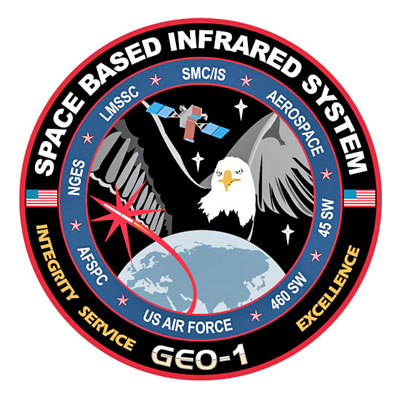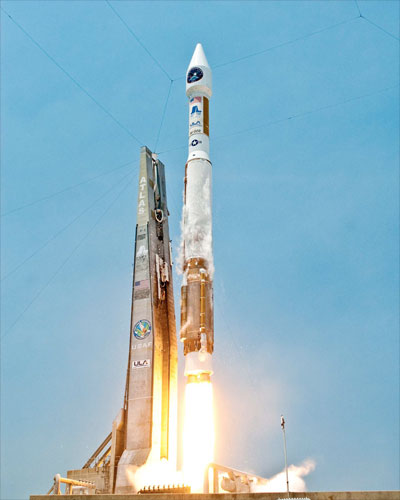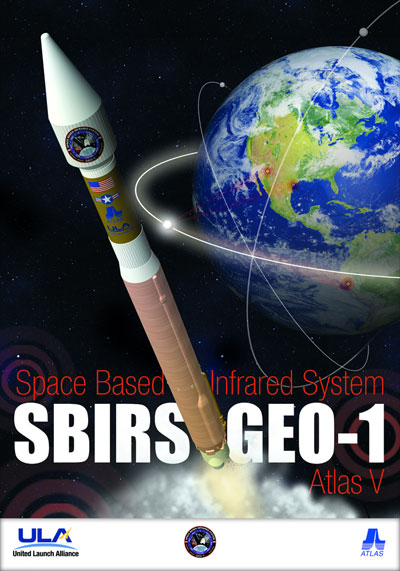|
|

|
|
Author
|
Topic: Atlas V 401/SBIRS GEO 1: 50th ULA Launch
|
Robert Pearlman
Editor Posts: 42988
From: Houston, TX
Registered: Nov 1999
|
 posted 05-03-2011 09:50 AM
posted 05-03-2011 09:50 AM
   
United Launch Alliance release Atlas V Set to Launch SBIRS GEO 1 Rocket/Payload: Atlas V launching the Space Based Infrared Systems (SBIRS GEO 1) satellite for the U.S. Air Force. Date/Launch Time/Site: May 6 from Space Launch Complex-41 at Cape Canaveral Air Force Station, Fla., with a launch window of 2:14 - 2:54 p.m. EDT. Launch Notes: This will be ULA's 50th launch since inception Dec. 1, 2006. Mission Description: SBIRS, considered one of the nation's highest priority space programs, is designed to provide global, persistent, infrared surveillance capabilities to meet 21st century demands in four national security mission areas including: missile warning, missile defense, technical intelligence and battlespace awareness.  Viewing the Launch Online: A live simulcast of the TV broadcast will be available 20 minutes prior to launch on the ULA website. Launch Updates: To keep up to speed with updates to the launch countdown, dial the ULA launch hotline at 1-877-852-4321. Or follow our launch updates on Twitter: @ULALaunch. |
Robert Pearlman
Editor Posts: 42988
From: Houston, TX
Registered: Nov 1999
|
 posted 05-06-2011 02:35 PM
posted 05-06-2011 02:35 PM
   
Lockheed Martin release U.S. Air Force Poised to Launch First-of-its-Kind Space Based Infrared System SatelliteThe U.S. Air Force and Lockheed Martin are ready to launch the first Space Based Infrared System (SBIRS) geosynchronous (GEO-1) spacecraft aboard a United Launch Alliance Atlas V launch vehicle from Cape Canaveral Air Force Station, Fla. SBIRS GEO-1 will enhance early warning of missile launches around the globe, support the nation's ballistic missile defense system, greatly expand our technical intelligence gathering capability, and provide enhanced situational awareness for warfighters on the battlefield. "SBIRS GEO-1 represents the dawn of a new era in overhead persistent infrared surveillance that will greatly improve national security for years to come," said Brig Gen (select) Roger W. Teague, the U.S. Air Force's Infrared Space Systems Directorate director. "We look forward to getting this next generation system on orbit and delivering its enhanced capabilities to the warfigher." The GEO-1 satellite includes highly sophisticated scanning and staring sensors that will deliver enhanced infrared sensitivity and a reduction in area revisit times over the current constellation. The scanning sensor will provide a wide area surveillance of missile launches and natural phenomena across the earth, while the staring sensor will be tasked to observe smaller areas of interest with enhanced sensitivity. "SBIRS GEO-1 will usher in a new era of critical missile warning capabilities vital to our national security, and we are focused on delivering mission success for the warfighter," said Jeff Smith, Lockheed Martin's vice president and SBIRS program director. "The dedication, talent and integrity of the entire SBIRS team has been remarkable, and this launch will be a testament to every individual who has supported this vitally important program." The SBIRS team is led by the Infrared Space Systems Directorate at the U.S. Air Force Space and Missile Systems Center. Lockheed Martin is the SBIRS prime contractor, with Northrop Grumman as the payload integrator. Air Force Space Command operates the SBIRS system. Headquartered in Bethesda, Md., Lockheed Martin is a global security company that employs about 126,000 people worldwide and is principally engaged in the research, design, development, manufacture, integration and sustainment of advanced technology systems, products and services. The Corporation's 2010 sales from continuing operations were $45.8 billion. |
Robert Pearlman
Editor Posts: 42988
From: Houston, TX
Registered: Nov 1999
|
 posted 05-06-2011 02:40 PM
posted 05-06-2011 02:40 PM
   
United Launch Alliance release The launch of an Atlas V carrying the Air Force's Space Based Infrared Systems (SBIRS) GEO-1 payload was scrubbed today due to weather. Flight rules associated with cumulus clouds were in violation of launch criteria. The Atlas V vehicle and SBIRS are safe and secure at this time. The launch is rescheduled for Saturday, May 7 from Space Launch Complex-41 at Cape Canaveral Air Force Station, Fla. The opening of the launch window is 2:10 p.m. EDT and extends until 2:50 p.m. The forecast for May 7 shows a 90 percent chance of favorable weather conditions for the launch tomorrow.
|
Robert Pearlman
Editor Posts: 42988
From: Houston, TX
Registered: Nov 1999
|
 posted 05-07-2011 06:00 PM
posted 05-07-2011 06:00 PM
   
United Launch Alliance release United Launch Alliance Marks 50th Successful Launch by Delivering the Space-Based Infrared System (SBIRS) Satellite to Orbit for the U.S. Air Force A United Launch Alliance Atlas V rocket carrying the Space-Based Infrared System (SBIRS) satellite for the United States Air Force lifted off from Space Launch Complex-41 here at 2:10 p.m. EDT today. This marks the 50th successful launch for ULA since the company was formed in December 2006. "With this launch, ULA continues to demonstrate its commitment to 100 percent mission success," said Michael Gass, ULA President and CEO. "This milestone is a testament to the dedicated employees that for every mission deliver excellence, best value and continuous improvement to our customers." 
Credit:Pat Corkery/ULAThis mission was launched aboard an Atlas V 401 vehicle configuration, which includes a 4-meter diameter payload fairing. The booster for this mission was powered by the RD AMROSS RD-180 engine and the Centaur upper stage was powered by a single Pratt & Whitney Rocketdyne RL-10A engine. "This is a very important day for our customers and for our nation," said Jim Sponnick, ULA vice president, Mission Operations. "The ULA team is extremely proud to have served with this strong government and industry team in successfully launching the SBIRS GEO-1 satellite on its critical mission." SBIRS is a consolidated system intended to meet United States infrared space surveillance needs for decades to come. The SBIRS program addresses critical warfighter needs in the areas of missile warning, missile defense and battlespace characterization. ULA's next launch is the Delta II Aquarius mission currently scheduled for June 9, 2011 from Space Launch Complex-3 at Vandenberg Air Force Base, Calif. ULA program management, engineering, test and mission support functions are headquartered in Denver, Colo. Manufacturing, assembly and integration operations are located at Decatur, Ala., Harlingen, Texas, San Diego, Calif. Launch operations are located at Cape Canaveral AFS, Fla., and Vandenberg AFB, Calif. |
Robert Pearlman
Editor Posts: 42988
From: Houston, TX
Registered: Nov 1999
|
 posted 05-07-2011 06:04 PM
posted 05-07-2011 06:04 PM
   
45th Space Wing release 45th Space Wing Successfully Launches First SBIRS GEO-1 Satellite The U.S. Air Force's 45th Space Wing successfully launched a United Launch Alliance-built Atlas V Evolved Expendable Launch Vehicle at 2:10 p.m. today from Space Complex 41. The Atlas V rocket carried into orbit the Space Based Infrared System (SBIRS) GEO-1 satellite. This SBIRS GEO launch begins the replacement of the Defense Support Program (DSP) constellation, which has been in operations since 1960. SBIRS will provide critical functions for protecting the United States and its allies by supporting four mission areas: Missile Warning (MW), Missile Defense (MD), Battlespace Awareness (BA), and Technical Intelligence (TI). 
Credit: 45th Space WingGen. William Shelton, Air Force Space Command commander, highlighted this launch was the culmination of many years of hard work and a tremendous team effort. "Last year, we celebrated the 40th anniversary of DSP. Today, we launched the next generation missile warning capability. It's taken a lot of hard work by the government-industry team and we couldn't be more proud. We look forward to this satellite providing superb capabilities for many years to come," said General Shelton. Brig. Gen. Ed Wilson, commander, 45th Space Wing, said the entire 45th Space Wing team was also pleased to be a part of this milestone launch. "The teamwork across the Ai Force Space Command made this launch a success and is another example of how our Air Force delivers assured space launch, range and combat capabilities for the nation," General Wilson said. "On a personal note, it is tremendously gratifying to be involved in the fielding of this next-generation SBIRS capability since my father was involved in the operational standup of the original DSP capability in the early 1970s while he was on active duty." | |
Contact Us | The Source for Space History & Artifacts
Copyright 2020 collectSPACE.com All rights reserved.

Ultimate Bulletin Board 5.47a
|
|

|
 advertisement advertisement

|














